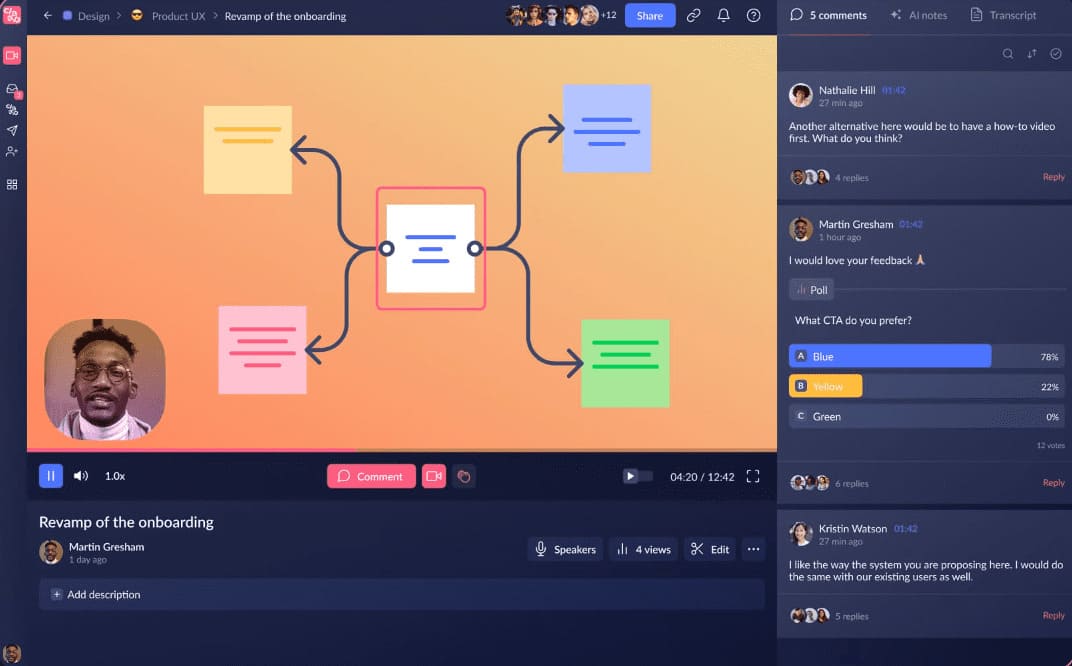What should you look for in a Head of Sales candidate?
What are the responsibilities of a Head of Sales?

Interviewing candidates for a job isn’t an easy thing. But there is always ONE thing you need to know: what are the requirements of the job. If you’re here, you’d certainly like to know what’s expected from a Head of Sales. Well, a Head of Sales has 5 main responsibilities:
- Managing sales teams: As the name suggests, a Head of Sales is at the head of the sales team. He/she has to monitor the sales teams work and optimize sales processes.
- Developing sales strategies: A Head of Sales is responsible for defining effective sales strategies and ensuring their proper execution to meet revenue targets.
- Managing key client relationships: A Head of Sales has to be actively involved in the relationship with key clients to solve potential issues and maintain high levels of customer satisfaction
- Collaborating with other departments: The Head of Sales has a central role in a company and needs to know how to collaborate with other departments (Marketing, Finance…) to help the company achieve its objectives.
- Identifying business opportunities: The Head of Sales is in charge of analyzing market trends and other external dynamics to identify potential business opportunities.
Now you have a good basis to interview candidates. But let’s go a step further by actually defining what is expected from the candidate during the interview.
How to find the ideal Head of Sales candidate?

During the interview, you expect the candidate to demonstrate he/she would be a good Head of Sales. For that, you need to evaluate the following skills and qualities:
- Leadership and management skills: The candidate should demonstrate he/she is able to manage a sales team properly and motivate the team members to perform. A track record of leading teams would be a plus.
- Sales strategy and vision: An outstanding candidate should be able to explain clearly how he/she would define and implement a successful sales plan to meet revenue objectives.
- Customer relationship management: The candidate should be able to prove he/she can build and maintain strong client relationships. He/she should also be capable of understanding and solving complex customer issues.
- Communication and negotiation skills: A strong candidate should be able to show exceptional communication and negotiation skills with the team and with clients.
If you already knew that, you’ll certainly be a great interviewer. If you didn’t, you can thank me because now you’ve everything you need to become a great interviewer. But no matter your situation, a scorecard template will help you become an even better interviewer! So let’s see how to build a Head of Sales scorecard template.
How to craft your Head of Sales scorecard template?

Why do you need a Head of Sales scorecard template?
I just noticed I didn’t even tell you WHY your scorecard template will help you become a better interviewer. So here are the reasons:
- To stay organized: A scorecard template is a guide for your interviews. It will either contain all the questions you have to ask or the areas to evaluate. With a scorecard template, you can be sure that you’ll never have a blank during the interview!
- To make the right choice: In the word “scorecard” you have “score”. Let’s not forget the main objective of a scorecard template: scoring candidates! A scorecard template is optimized to help you assess the performance of the candidate by scoring him/her on each area of the scorecard. You can then compute a total score for each candidate and make an objective choice based on that!
- To keep track of the interview: There are different kinds of scorecard templates. You can totally have an area to write the answer of the candidate for each question you ask him/her. But even if you have a classic scorecard template (questions/areas to evaluate and score associated), it’s a great way to keep track of an interview, and come back to a candidate’s performance if needed. But if it’s really important for you to keep track of your interviews, I recommend using Claap, as you’ll be able to entirely record your interviews!
Building your Head of Sales scorecard template: the complete guide

Now that you know how important it is to have a scorecard template, let’s craft it together! Nothing easier, just follow these X steps:
- Take a standardized scorecard template: You can find one here. I created this template as well so you can go there with your eyes closed!
- Choose the type of template you want: You have 2 choices: the general template evaluating areas and the “questions” template containing specific questions.
- Fill your template: If you’ve chosen the general template, fill it with the areas to evaluate. Here it would be Leadership and management skills, Sales strategy and vision, Customer relationship management and Communication and negotiation skills. If you’ve chosen the “questions” template then the following section is for you!
37 Head of Sales interview questions

No matter the template you chose, you need to have questions to ask the interviewee! So here are 37 great questions to evaluate the skills of the candidate!
General questions:
- Could you go through your resume and detail your sales background?
- Give me a piece of feedback you’ve received from your previous employer.
- How did you decide to get into sales?
- What do you like about sales?
- What resources/tools do you use in your job?
- Tell me about your decision-making process.
Leadership and management skills:
- Tell me about the teams you managed in your previous experiences.
- What makes you a good leader?
- Can you share an example of a challenging situation with your team and how you navigated through it as a leader?
- How do you motivate your teams?
- How would you describe your management style?
- How would you assess the success of your teams?
- How would you delegate tasks among your sales team?
- What strategies do you employ to develop and nurture a high-performing sales team?
Sales strategy and vision:
- What strategy would you implement to meet the quotas?
- Can you outline a successful sales strategy you developed and implemented in a previous role?
- Explain your sales job in your previous company.
- How do you set sales targets?
- What strategies do you use to generate leads?
- What sales techniques do you find most effective?
- How do you stay updated on industry trends?
- Do you have experience writing sales reports?
- In the ever-changing market, how do you adapt your sales strategy to stay competitive?
Customer relationship management:
- How do you handle customer objections and rejections?
- How would you proceed to solve a conflict between a member of your sales team and a client?
- Tell me about a time you worked with a challenging client.
- How do you build and maintain strong client relationships in the long term?
- How do you approach customer feedback?
- Can you share an experience where your relationship-building efforts directly contributed to business growth?
- How do you approach customer retention and ensure high levels of customer satisfaction?
Communication and negotiation skills:
- How do you communicate sales targets and expectations to your team?
- How do you handle conflicts or disagreements within your team?
- How would you handle a sales staff member not meeting his/her quotas?
- Can you provide an example of a successful negotiation with a client that resulted in a mutually beneficial outcome?
- Can you describe a time when you negotiated a complex sales deal/contract?
- How would you implement a successful collaboration between the sales teams and the other departments?
- In what ways do you tailor your communication style when interacting with different stakeholders, both internal and external?
Sample answers

- How would you describe your management style?
Sample Answer: "I would describe my management style as collaborative and empowering. I believe in fostering a supportive environment where team members feel valued and empowered to contribute their ideas and expertise. I provide clear guidance and direction while also encouraging autonomy and innovation. Regular feedback and open communication are integral to my approach, as they help to ensure alignment with team goals and individual growth."
- How do you set sales targets?
Sample Answer: "Setting sales targets involves a comprehensive analysis of historical data, market trends, and company objectives. I begin by assessing past performance and identifying areas of potential growth and improvement. Then, I collaborate with key stakeholders to establish realistic and achievable sales targets that align with the company's overall strategic goals. Continuous monitoring and adjustment are essential to ensure targets remain relevant and attainable in a dynamic business environment."
- How would you proceed to solve a conflict between a member of your sales team and a client?
Sample Answer: "Resolving conflicts between a member of my sales team and a client requires a proactive and empathetic approach. First, I would listen carefully to both parties to understand their perspectives and concerns. Then, I would facilitate a constructive dialogue aimed at finding a mutually beneficial solution. Mediation may be necessary to address misunderstandings and rebuild trust. Throughout the process, I remain objective and focused on preserving the relationship while upholding the company's values and priorities."
- How would you handle a sales staff member not meeting his/her quotas?
Sample Answer: "Addressing performance issues with a sales staff member who is not meeting quotas requires a thoughtful and supportive approach. I would start by conducting a private meeting to discuss performance expectations and identify any underlying challenges or obstacles. Together, we would develop a performance improvement plan tailored to the individual's strengths and areas for development. Regular feedback and coaching sessions would be implemented to monitor progress and provide additional support as needed. If necessary, I would explore alternative roles or training opportunities to help the team member succeed while maintaining accountability for meeting sales targets."
Why you should use Claap with your Head of Sales scorecard template

I might not be the most objective person, but I’ve been using Claap with my interviews for months, and I would feel guilty not mentioning it. Claap is an audio and video transcription tool that will change your LIFE as an interviewer. And I’ll show you why:
HClaap is an automatic notetaker
Yes you heard me correctly, Claap is an automatic notetaker. It means you don’t have to take notes by yourself, Claap does it for you!
This is why I always recommend using Claap with your scorecard template: you don’t have to bother with writing the answer of the candidate and can focus on the performance of the candidate.
And if you think that having notes on one document and your scorecard template on another is not efficient, you can rest assured! With its AI features, Claap automatically adapts the notes to your own template!

Claap records your interviews
I already mentioned this one previously but it’s important to know. Because Claap doesn’t only record your videos, it also helps you find them afterwards with its smart video library combined with its transcription ability. You can find a past interview and the notes associated using a word used during the interview!

Claap changes the way your work!
Beyond these features, Claap is a great tool to improve collaboration within your team and even within your company. And it can make your interview process even more efficient.
For instance, using Claap’s workspaces, you can easily share your recorded interviews to the people you want: HR, other interviewers, anything is possible! You can justify a decision, ask for validation, collect feedback and many other things that make your interview process fairer and more objective!
The realm of possibilities is infinite with Claap, so why not give it a try to see for yourself?
FAQ






